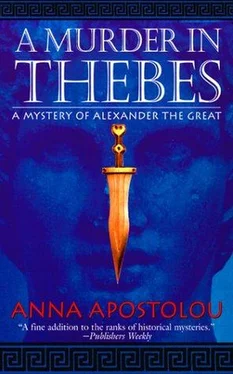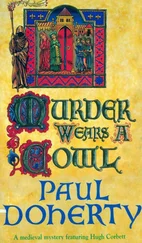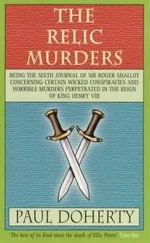Paul Doherty - A Murder in Thebes
Здесь есть возможность читать онлайн «Paul Doherty - A Murder in Thebes» весь текст электронной книги совершенно бесплатно (целиком полную версию без сокращений). В некоторых случаях можно слушать аудио, скачать через торрент в формате fb2 и присутствует краткое содержание. Год выпуска: 2013, ISBN: 2013, Издательство: Headline, Жанр: Исторический детектив, на английском языке. Описание произведения, (предисловие) а так же отзывы посетителей доступны на портале библиотеки ЛибКат.
- Название:A Murder in Thebes
- Автор:
- Издательство:Headline
- Жанр:
- Год:2013
- ISBN:9780755395736
- Рейтинг книги:4 / 5. Голосов: 1
-
Избранное:Добавить в избранное
- Отзывы:
-
Ваша оценка:
- 80
- 1
- 2
- 3
- 4
- 5
A Murder in Thebes: краткое содержание, описание и аннотация
Предлагаем к чтению аннотацию, описание, краткое содержание или предисловие (зависит от того, что написал сам автор книги «A Murder in Thebes»). Если вы не нашли необходимую информацию о книге — напишите в комментариях, мы постараемся отыскать её.
A Murder in Thebes — читать онлайн бесплатно полную книгу (весь текст) целиком
Ниже представлен текст книги, разбитый по страницам. Система сохранения места последней прочитанной страницы, позволяет с удобством читать онлайн бесплатно книгу «A Murder in Thebes», без необходимости каждый раз заново искать на чём Вы остановились. Поставьте закладку, и сможете в любой момент перейти на страницу, на которой закончили чтение.
Интервал:
Закладка:
“Alexander said his most beloved of mothers was insistent on that.”
“Of course. She would,” Miriam responded. “There’s nothing that Olympias likes better than an audience.”
The boy’s eyes strayed to where Antigone and Simeon were standing behind her. He narrowed his eyes and gnawed at his lips.
“Is that all?” Miriam asked.
“Ah, no.” Castor’s eyes become pleading. “I have one favor, mistress. When the army marches, will you take us with you? We can cook, clean, sew. .”
“Aye, and lie and steal!” Simeon intervened.
Castor lifted his hand, middle finger extended to make an obscene gesture, but then thought differently about it.
“I’ll think about it,” Miriam declared. “Now go back to the camp. Tell my lord king that I will be there.”
Castor sped off. He ran the gauntlet of jeers and shouts from the guards. Just before he disappeared into the trees, Castor stopped, bent down, pulled up his tunic, and showed his bare arse to the soldiers. That was followed by another obscene gesture, then Castor disappeared into the olive grove.
“A lad of spirit,” Antigone observed.
She followed Miriam out the gate and into the trees. “I’ve heard you mention Alcibiades. Wasn’t he one of the officers in the Cadmea?”
“He’s disappeared,” Miriam explained. “Some people think he’s the spy responsible for the theft of the Crown. Why, did you know him?”
Antigone shook her head.
They reached the path and walked up to the shrine. Antigone pulled the cowl of her cloak over her head and kept her face down. She seemed nervous around the guards lounging on the steps. Their officer brusquely examined the pass.
“Do you want us to accompany you?” he asked.
The officer was in full armor. His great Corinthian helmet with its blood-red plume made him look like a giant, eyes glittering behind the metal rims.
“No.” Miriam thanked him. “Just open the doors. Lock us inside.”
The officer agreed. The outer and inner doors were opened then closed behind them. The shrine was dark, cold, and empty. Antigone crouched in the corner while Miriam examined the pits. The charcoal had been raked out and, beyond the spikes, lay nothing more than a stinking trench.
“What happened to the snakes?” Antigone called out.
“Alexander hates them,” Simeon replied. “I suspect they were raked out and put in sacks.”
“They were sacred,” Antigone countered.
“Not to Alexander,” Miriam snapped. She walked up to the pillar and looked at the metal clasps. They had been intricately made by some blacksmith many years earlier. They were hinged. One part was riveted to the pillar; the other could swing backward and forward. There were three clasps in all; at the back of the pillar protruded a wooden peg on which the Crown had rested. Miriam scrutinized this carefully. She walked back, taking care when she crossed the row of spikes dividing the two pits.
“It’s nothing more than a dirty chamber, is it?” Antigone declared, getting to her feet. “The glory and the power are gone.”
Miriam knelt and stared at the pillar.
“Antigone,” she pleaded, “can’t you help us? Didn’t Jocasta ever tell you how the Crown could be removed?”
“It was a secret,” the priestess replied, “handed down from one high priestess to another.”
Miriam sat, the iron bar with its protruding plate at the end nestling against her waist.
“Tell me,” she said, “the Crown was removed on certain occasions?”
“Aye, on great feasts no more than two, three times a year.” Antigone replied absentmindedly.
“So.” Miriam made herself comfortable. She grasped the iron bar; it was cool in her sweaty grasp. “The high priestess came in here by herself?”
“Yes,” Antigone replied. “Everyone else would wait outside. Once she was ready, Jocasta would unlock the bronze doors and release the bar. The doors would swing open. Everyone would file in, and Jocasta would hold up the Crown. Whatever the occasion was, the taking of oaths or pledges, the leaders of the council would touch the Crown held by Jocasta with the tips of their fingers. When the ceremony was over they would retire.”
“Was the Crown heavy?” Simeon asked.
“Oh, no,” Antigone replied, “it looked much heavier than it was. In fact, it seemed very light.”
“But where was the secret kept,” Simeon persisted, “I mean, if the high priestess died suddenly?”
“I don’t know,” Antigone confessed. “You saw the pectoral that Jocasta wore; that was her symbol of office.”
Miriam stared down at the floor. She recalled that awful, half-burned cadaver. “The pectoral wasn’t there!” she murmured. “When Jocasta was killed, I am sure the pectoral was gone!”
“Perhaps her killer took it,” Antigone replied, “or the soldier who found the corpse?”
“No, no he wouldn’t have taken it,” Miriam countered. “Such looting would mean crucifixion.” Miriam moved and, as she did, felt a tug, as if the dagger in the sash around her waist had been pulled. She moved away from the iron bar.
“What on earth?” She took the dagger out and crouched down. She pushed the blade close to the iron plate on the end of the bar; the dagger stuck to it.
“Simeon, here, look!”
Her brother hastened across. She did it again, the dagger stuck hard against the side of the plate.
“It’s a magnet,” Miriam declared, springing to her feet. She crouched down on hands and knees, moving along the iron bar. The clasps that held it to iron stands riveted into the ground were not soldered fast and could be pulled back. Miriam, assisted by Simeon, now pulled these loose and lifted the bar up. It was as long as one of the great pikes carried by the guards regiment in battle and, like them, surprisingly light.
“It’s hollow,” Simeon exclaimed.
Miriam lowered the pole; it swayed precariously in her hand. She recalled how soldiers managed their pikes in battle. She turned slightly sideways and, coming to the edge of the charcoal pit, lowered the pole. At first she was clumsy but eventually, helped by Simeon and watched by round-eyed Antigone, they lowered the pole so that the magnet at the end caught the iron clasps. These were easily pulled back. She tried each one.
“The clasps are well oiled,” she murmured. “They come away, and because of the wooden peg at the back, the Crown would remain firm.” She thrust the pole into Simeon’s hand, went across, placed her dagger on top of the pillar, and going back, lowered the pole again. The magnet caught the dagger. She lifted this up, pulling the pole back as if it were a piece of rope, and with a cry of triumph, she snatched the dagger from the end. She turned, face bright.
“That’s how it was done! That’s the secret! Using the plate on the end of the pole you can release the clasps and then, with the magnet, simply lift the Crown off!”
“It’s even easier than that.” Simeon examined the iron plate, pointing to how it tapered to a sharp end. “If you are unsure of the magnet, you can use this to prize the clasp loose and then hook up the Crown.”
“That’s how it was done,” Miriam exclaimed. “The high priestess kept to the ritual; she did not bring anything into the shrine.”
Antigone stared, mouth half open in surprise.
“Jocasta knew that,” Simeon confirmed, “but the one who stole the Crown. How would he know?”
“The pectoral,” Miriam declared. “That’s why the assassin burned Jocasta’s corpse. He wasn’t trying to hide any sign of torture but to disguise the fact that he had taken the pectoral. Don’t you remember?” Miriam continued excitedly, “the pectoral had a pendant in the center.”
Читать дальшеИнтервал:
Закладка:
Похожие книги на «A Murder in Thebes»
Представляем Вашему вниманию похожие книги на «A Murder in Thebes» списком для выбора. Мы отобрали схожую по названию и смыслу литературу в надежде предоставить читателям больше вариантов отыскать новые, интересные, ещё непрочитанные произведения.
Обсуждение, отзывы о книге «A Murder in Thebes» и просто собственные мнения читателей. Оставьте ваши комментарии, напишите, что Вы думаете о произведении, его смысле или главных героях. Укажите что конкретно понравилось, а что нет, и почему Вы так считаете.












